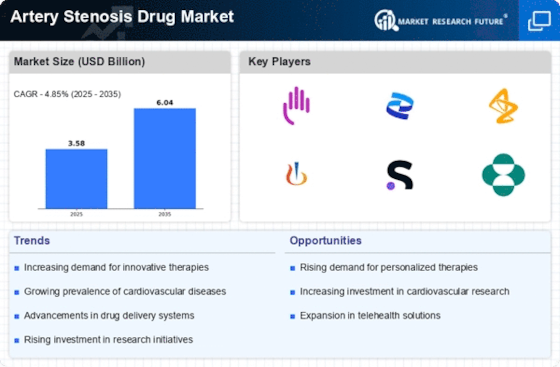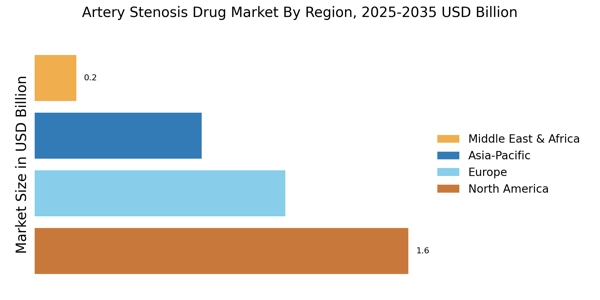Rising Awareness and Screening Programs
The heightened awareness of cardiovascular health and the implementation of screening programs are driving growth in the Artery Stenosis Drug Market. Public health campaigns aimed at educating individuals about the risks associated with artery stenosis have led to increased screening and early diagnosis. This proactive approach enables timely intervention, thereby expanding the patient population requiring treatment. As more individuals are diagnosed with artery stenosis, the demand for effective pharmacological therapies is expected to rise. Consequently, pharmaceutical companies are likely to respond by developing and marketing new drugs tailored to this growing demographic, further propelling the Artery Stenosis Drug Market.
Regulatory Support for Innovative Therapies
Regulatory bodies are increasingly supportive of innovative therapies, which is positively impacting the Artery Stenosis Drug Market. Streamlined approval processes and incentives for the development of breakthrough therapies are encouraging pharmaceutical companies to invest in research and development. This regulatory environment fosters the introduction of novel drugs that address unmet medical needs in artery stenosis treatment. As a result, the market is likely to see a diversification of treatment options, enhancing patient outcomes. The collaboration between regulatory agencies and industry stakeholders suggests a favorable landscape for the Artery Stenosis Drug Market, as it adapts to the evolving healthcare needs.
Advancements in Drug Formulation Technologies
Innovations in drug formulation technologies are significantly influencing the Artery Stenosis Drug Market. The development of novel drug delivery systems, such as nanoparticles and sustained-release formulations, enhances the efficacy and safety profiles of treatments for artery stenosis. These advancements allow for targeted therapy, reducing side effects and improving patient compliance. Furthermore, the integration of biopharmaceuticals into treatment regimens is expected to expand the market, as these therapies often demonstrate superior outcomes compared to traditional medications. The ongoing research in formulation technologies suggests a promising future for the Artery Stenosis Drug Market, as companies strive to meet the evolving needs of patients and healthcare providers.
Growing Investment in Cardiovascular Research
The increasing investment in cardiovascular research is a significant catalyst for the Artery Stenosis Drug Market. Governments and private entities are allocating substantial funds to explore new therapeutic avenues and improve existing treatments for artery stenosis. This influx of capital is likely to accelerate the pace of clinical trials and the development of innovative drugs. For instance, recent funding initiatives have focused on understanding the underlying mechanisms of artery stenosis, which could lead to the discovery of novel drug targets. As research progresses, the Artery Stenosis Drug Market may witness a wave of new products entering the market, enhancing treatment options for patients.
Increasing Prevalence of Cardiovascular Diseases
The rising incidence of cardiovascular diseases, particularly artery stenosis, is a primary driver for the Artery Stenosis Drug Market. As populations age and lifestyle-related risk factors such as obesity and diabetes become more prevalent, the demand for effective treatments is expected to surge. According to recent estimates, cardiovascular diseases account for a substantial portion of global mortality, prompting healthcare systems to prioritize interventions. This trend indicates a growing market for drugs targeting artery stenosis, as healthcare providers seek to manage and mitigate the impact of these conditions. The increasing burden of disease is likely to stimulate research and development efforts, leading to the introduction of innovative therapies in the Artery Stenosis Drug Market.

















